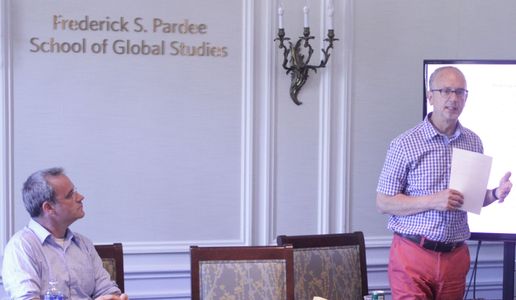Center for Study of Europe Hosts Talk on Brexit

The Center for the Study of Europe, a regional center of the Frederick S. Pardee School of Global Studies at Boston University, hosted a discussion on the recent United Kingdom referendum on which voters called by a margin of 52 percent to 48 percent to leave the European Union.
The June 26, 2016 discussion was led by Graham Wilson, Professor of Political Science at Boston University, and Peter Moloney, Visiting Assistant Professor of History at Boston College, and focused on how the result of the referendum will affect the future of both the United Kingdom and Europe.
Wilson said the result of the referendum was particularly surprising given the consensus among financial experts and institutions that a vote to leave the EU would have negative fiscal consequences.
“Every established economic organization counseled against leaving,” Wilson said. “The UK Treasury, the International Monetary Fund, The Bank of England — you could keep going on, both international and domestic. It was almost unprecedented to see such unanimity among economic professionals in their assessments of costs and benefits of an issue. The overwhelming opinion was this is going to cost you. That didn’t register and this reflects the enormous distrust of elites that exists in Britain.”
Moloney said the leaders of the “Leave” campaign were able to channel public frustration on a number of issues toward the shortcomings of the EU.
“This really opened up a Pandora’s Box of public frustration — not always linked directly to the European Union,” Moloney said. “Austerity, immigration, stretched public services, the impact of globalization on jobs — all this fed public opinion. It wasn’t all to blame on the EU in reality, but if packaged properly it could be blamed on the EU.”
Wilson said the demographic breakdown of the vote was revealing, with the majority of younger voters backing “Remain” and older voters backing “Leave.”
“This age contrast is very revealing. Why would young people be so much more in favor of remain? I think if you put yourself in their shoes, they are people for who there has always been a channel tunnel and for that matter cheap flights to anywhere in Europe and the possibility of studying around Europe through the Erasmus Program of the European Union,” Wilson said. “The other thing which hasn’t been much emphasized is that 2008 was a formative experience for them — the crash, worries about jobs, the economic uncertainty that everybody associates with that generation.”
Moloney said the referendum was not legally binding, but deemed the possibility of Parliament choosing not to honor the result of the vote unlikely.
“Legally they could stop it, but politically it would be suicide,” Moloney said. “You would undermine the entire democratic system, you would pose challenges to the authority of the people and it’s probably a place they just don’t want to go.”